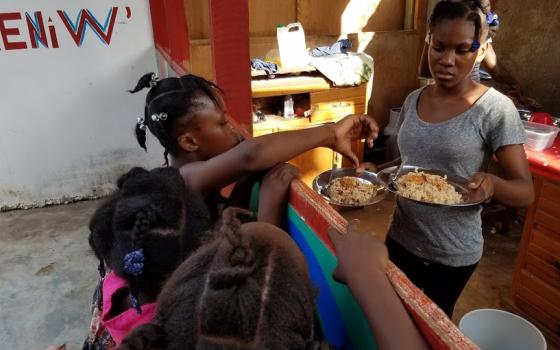Yet another congregation of women religious has joined the growing chorus of those taking public stances for more humane policies toward immigrants and refugees.
The Sisters of the Holy Names of Jesus and Mary's U.S.-Ontario Province announced May 8 they had overwhelmingly adopted a corporate stand expressing solidarity with those President Donald Trump's administration wants to turn away and remove.
"Members of the SNJM community have long supported immigrants through public actions such as vigils, marches and letter-writing campaigns, as well as countless quiet acts of solidarity and hospitality toward refugee families and individuals," SNJM Provincial Sr. Maureen Delaney said in a written statement. "Our corporate stand will give new impetus to these actions."
The corporate stand is a commitment to unite with others in response to the worldwide crisis of human migration and the growing anti-immigrant bias in the countries where people seek refuge. The congregation says about 65 million people have been forcibly displaced by not only violence, poverty and disease, but from government policies that feed fear and persecution of immigrants.
The sisters said their decision was based on Gospel values, Catholic social teaching and the congregation's unique mission, which is "the full development of the human person through education, social justice, contemplation and the arts." It came after in-depth study, dialogue, prayer and a vote by members of the congregation and their associates from the United States, Canada, Peru, Brazil and Lesotho.
In 2004, the congregation adopted a corporate stand against human trafficking and in 2008, a stand affirming access to clean water as a basic human right.
Catholics push for protection for Haitians in the US
In similar news, four Catholic groups joined together to urge Department of Homeland Security Secretary John F. Kelly to extend the Temporary Protected Status designation for Haiti for another 18 months.
A Temporary Protected Status designation allows Haitians who were in the United States prior to a series of devastating events to remain in the country until their homeland has recovered from the disasters. The current TPS expires July 22, but Kelly could extend it another 18 months.
USA Today reported that the head of the U.S. Citizenship and Immigration Services department has recommended the status end. Doing so would force an estimated 58,000 Haitians to return home.
Haiti was given protected status after the devastating 2010 earthquake, and it has been extended several times, as recovery has been painfully slow and hampered by a huge cholera outbreak, and then set back dramatically by Hurricane Matthew last October.
The U.S. Conference of Catholic Bishops' Committee on Migration, Catholic Relief Services, Catholic Charities USA, and the Catholic Legal Immigration Network Inc. wrote a joint letter to Kelly, saying, "Our nation has a moral responsibility to provide continued temporary protection."
"Given the current country conditions in Haiti, terminating TPS would be inhumane and untenable. ... We are concerned about the Haitian people and believe that one element of ensuring stability is extending the designation of TPS for Haiti," the letter says.
Since relief efforts are still ongoing — aid workers have reported finding hundreds of people living in caves because they have nowhere to go — there is no way Haiti can accommodate the return of 58,000 people, the letter said: "Doing so would undoubtedly destabilize the small nation and potentially bring harm to those returned."
Extending the status, however, will allow Haitians in the United States to continue to legally work and continue to send money home while their nation rebuilds, the letter said.
Another Ebola outbreak, but pump the brakes on the panic
May 12, news organizations all over the world rushed to breathlessly report that the World Health Organization had declared an Ebola outbreak. Coming on the heels of the 2014-2015 outbreak in West Africa, which claimed thousands of lives in several countries, the news sounds dire.
But, once again, context is everything.
The outbreak is in a rural area of the Democratic Republic of Congo. This matters for several reasons, first and foremost being that DRC, in Central Africa, is where Ebola first appeared in 1976. That nation has had outbreaks since then and is both experienced and equipped for dealing with them.
That was not the case two years ago, when the outbreak was in West Africa, afflicting nations that were inexperienced, ill-prepared and not at all equipped for an outbreak. The current outbreak is also in a rural area, where it is more difficult to spread, while the outbreak two years ago was in urban areas, and the close proximity of thousands of people allowed the virus to spread like wildfire.
True, Ebola is incredibly dangerous and one of the most deadly viruses known. One person has died, at least nine more are infected, and there are other deaths that have not yet been confirmed as caused by Ebola, the Washington Post reported. But DRC and aid groups are responding quickly and with the knowledge gained from experience.
So offer prayers, make a donation or find some other way to help. But there is no need to panic.
Remember, links, tips and accounts of the response to any crisis anywhere in the world are always welcome at dstockman@ncronline.org.
[Dan Stockman is national correspondent for Global Sisters Report. Follow him on Twitter or on Facebook.]

